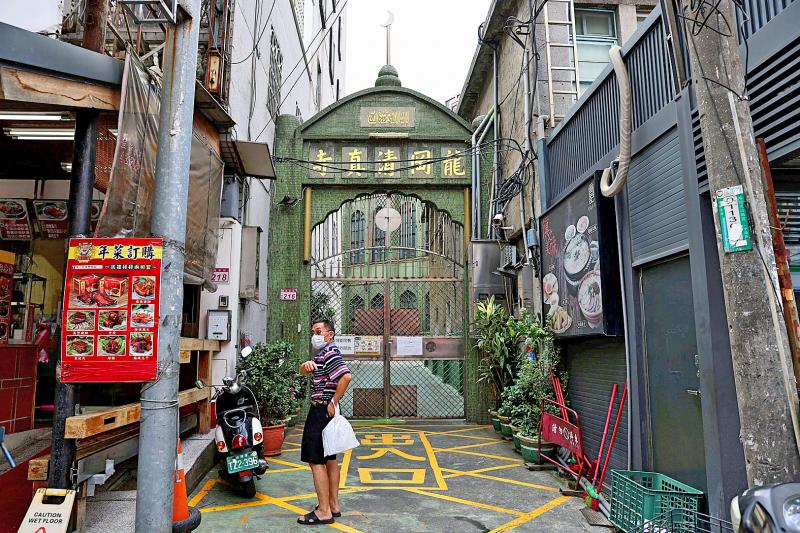The Ministry of the Interior (MOI) yesterday announced new guidelines for large-scale gatherings, asking religious groups to suspend large events, while delaying the start of alternative military service amid rising cases of COVID-19.
Notifications have been sent to major temples and religious groups, asking them to postpone or cancel scheduled festivals and pilgrimage events, Deputy Minister of the Interior Chen Tsung-yen (陳宗彥) said.
Ministry staff are communicating with most religious organizations, Chen said, adding that given a rise in COVID-19 cases, it recommends suspending or postponing events with large crowds and outdoor pilgrimage activities, and for indoor functions to be held remotely online.

Photo: Ann Wang, REUTERS
When asked about pilgrimage events for which preparations have already begun, Chen said that “right after the Lunar New Year, we had already sent official letters to local governments and all religious organizations, recommending them to postpone or cancel activities with crowds of people, to prevent an outbreak of infection. So they are already prepared for the new measures, and are to make changes to conform to with Central Epidemic Command Center [CECC] guidelines.”
Minister of the Interior Hsu Kuo-yung (徐國勇) had also issued other new measures, such as limiting the capacity of mountain huts for hikers at all national parks to 100 people and delaying the call-up of men for alternative military service, Chen said.
Police and firefighters must wear protective clothing and masks while on duty, and sanitize afterward, Chen said.
“For government ministries, plans for decentralizing office work have been ready to go since last year. Large events related to the ministry have been delayed to later dates. If the situation changes, then government offices would follow up with appropriate measures,” Chen said.
The CECC on Wednesday announced upgraded COVID-19 prevention measures to remain in place until June 8, including restricting outdoor gathering and sporting events to fewer than 500 people, and indoor functions to fewer than 100, while reinstating a ban on food and drink on all trains.

An undersea cable to Penghu County has been severed, the Ministry of Digital Affairs said today, with a Chinese-funded ship suspected of being responsible. It comes just a month after a Chinese ship was suspected of severing an undersea cable north of Keelung Harbor. The National Communications and Cyber Security Center received a report at 3:03am today from Chunghwa Telecom that the No. 3 cable from Taiwan to Penghu was severed 14.7km off the coast of Tainan, the Ministry of Digital Affairs said. The Coast Guard Administration (CGA) upon receiving a report from Chunghwa Telecom began to monitor the Togolese-flagged Hong Tai (宏泰)

EVA Air is prohibiting the use of portable chargers on board all flights starting from Saturday, while China Airlines is advising passengers not to use them, following the lead of South Korean airlines. Current regulations prohibit portable chargers and lithium batteries from check-in luggage and require them to be properly packed in carry-on baggage, EVA Air said. To improve onboard safety, portable chargers and spare lithium batteries would be prohibited from use on all fights starting on Saturday, it said. Passengers are advised to fully charge electronic devices before boarding and use the AC and USB charging outlets at their seat, it said. South

Hong Kong-based American singer-songwriter Khalil Fong (方大同) has passed away at the age of 41, Fong’s record label confirmed yesterday. “With unwavering optimism in the face of a relentless illness for five years, Khalil Fong gently and gracefully bid farewell to this world on the morning of February 21, 2025, stepping into the next realm of existence to carry forward his purpose and dreams,” Fu Music wrote on the company’s official Facebook page. “The music and graphic novels he gifted to the world remain an eternal testament to his luminous spirit, a timeless treasure for generations to come,” it said. Although Fong’s

WAR SIMULATION: The developers of the board game ‘2045’ consulted experts and analysts, and made maps based on real-life Chinese People’s Liberation Army exercises To stop invading Chinese forces seizing Taiwan, board gamer Ruth Zhong chooses the nuclear option: Dropping an atomic bomb on Taipei to secure the nation’s freedom and her victory. The Taiwanese board game 2045 is a zero-sum contest of military strategy and individual self-interest that puts players on the front lines of a simulated Chinese attack. Their battlefield game tactics would determine the theoretical future of Taiwan, which in the real world faces the constant threat of a Chinese invasion. “The most interesting part of this game is that you have to make continuous decisions based on the evolving situation,